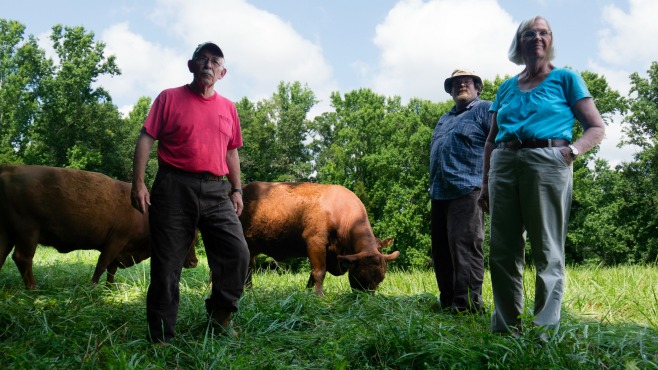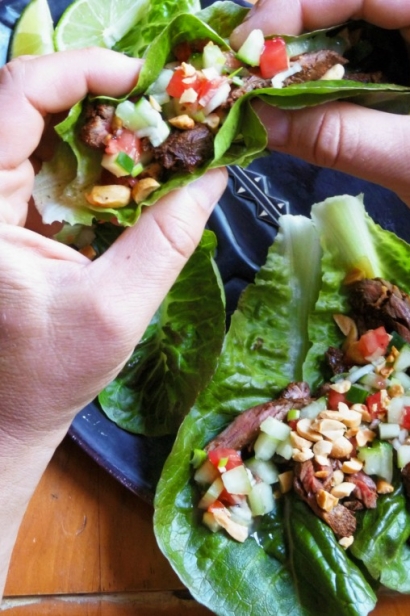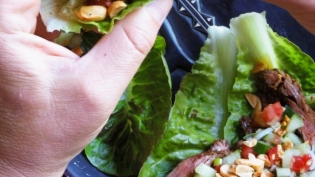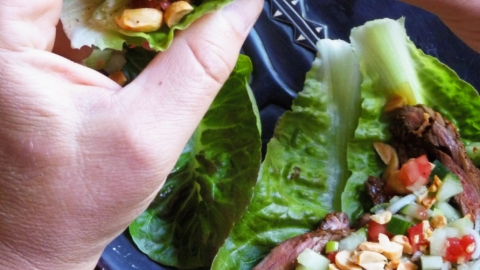Grass-Fed, Love-Fueled
"I love you and I want you to come home.”
Perhaps better than any other, this single sentence encapsulates the Walker family and their farm in Anderson. Theirs is a love story over a century in the making, the happy ending of which has resulted in the best beef and pork my wife and I have ever eaten.
If you’re like us, you’d be hard-pressed to recall the name of a single one of your ancestors living in 1898, the year that newlyweds William Walters Walker and Laura Kate Ellison Walker founded Walker Farms. Even if by some small chance you could trace your family lineage back to the year when Henry Ford had just invented his revolutionary “quadricycle,” chances are you probably don’t live on and farm the same land as they did.
During our short drive from Greenville to visit Walker Century Farms (“Century Farm” is an official designation given to farms that have been in the same family for over 100 years), my wife and I tried to imagine how different our own lives might be had we grown up with a strong family connection to a particular place. Resting in the shade of a tree that our great-great grandparents planted seemed like an exceedingly pleasant—albeit completely foreign—experience to us.
We can certainly say that the 21st century Walkers are not your average farmers—and there was not a covered wagon in sight when we visited them. In fact, Dr. Bill Walker practices Pulmonary and Sleep Medicine at AnMed Health and his wife Nancy is a retired PhD plant geneticist who taught at Clemson University. Nancy also briefly worked with Monsanto, but decided she’d had enough when she was asked to work on a project to create a genetically modified, transgenic strawberry plant using fish genes (yes, seriously). Today, the three primary “farmhands” are their son Clifton (who also works as a drug and alcohol addiction counselor), plus family friends Kelly and Kevin Porter who live on the farm.
To get to the Walker’s home (a replica of the original 19th century farmhouse), we drove up a long driveway adjoined by lush green fields dotted with square-shaped, ruby-colored cows. As the Walkers explained, these two characteristics are particular to the cattle their family has earned an international reputation for breeding: the famed Red Devon, arguably the most ancient breed of bovine.
It’s believed that the Phoenicians brought the original Bos lonqifrons cattle to the British Isles around 400 BCE to trade for tin. For centuries thereafter, they were bred as a multi-purpose animal that could pull a cart or plow, while also producing high-quality milk and beef. Given the moist, cool climate of their new home in Britain, relative to the hot, dry climate where they originated, Devons became a hardy breed that could thrive under virtually any condition, unlike many other modern cattle breeds. Devons are also quite docile, even friendly, animals. As such, they became the first bovines brought to the “New World,” sailing from England to Plymouth aboard the ship Charity in 1623.
The Walkers took us out to meet the 25 mature Devon cattle that roam the farm’s pastures and forest edges, foraging on a wide variety of wild grasses and legumes. “This is the diet that creates healthy cows; this is what their bodies know how to digest,” said Bill, pointing to the thick mat of grass beneath our feet. “The second you introduce grain into their diets is the second you create a whole domino effect of health problems, for the animals and for the people that end up eating their meat and dairy.”
According to Bill, grass-fed, grass-finished beef is the second healthiest commercially-available meat a person can eat, second only to wild-caught salmon. Unfortunately, a lot of store-bought beef labeled as “grass-fed” can be misleading, since many of these cows are often taken out of pasture and put into large Confined Animal Feeding Operations (CAFOs) where they’re “finished” on a diet of grains and “by-product” like municipal garbage, old candy, stale pastry, chicken feathers and other fillers. While this quickly fattens the animals, it also causes a host of medical problems stemming from the fact that their ruminant digestive systems aren’t adapted to a grain-based diet (or candy for that matter). To keep them alive, growing and disease-free during the grain-finishing stage, CAFOs have to give the cows a constant stream of growth hormones, antibiotics and other medications.
According to the research that the Walkers shared with us (many studies are listed on www.EatWild.com), grass-finished beef also has a wide range of nutritional benefits relative to its grain-fed equivalent, including: lower total fat (and thus calories); up to 400 percent more omega-3 fatty acids (the “good” heart-healthy fats); 500 percent more cancer-fighting conjugated linoleic acid (CLA); 400 percent more vitamin A; 300 percent more vitamin E and 200 percent more beta-carotene. Plus, grass-finished cows aren’t eating pesticide-covered foods or having to have their waste hauled away or treated in retainer ponds before being dumped into nearby waterways. In a pasture, these beneficial by-products help add fertility to the closed-loop system, creating more grass. It’s a beautiful, virtuous cycle that benefits man, animal and nature.
The Walkers interest in the health aspects of food is intensely personal, and relatively recent. “This is actually our second marriage...to each other,” Nancy told us. Their first marriage had fractured under the strains and stresses caused by heavy workloads and miscommunication. Throughout the years of their divorce, they both knew they still loved each other, but circumstances continued to keep them apart. Finally, 12 years later at a particularly low point in her life, Nancy reached out to Bill for support and advice. His message back was simple and straightforward: “I love you and I want you to come home.” The next day, Nancy came “home” to Bill and the farm, and the two were soon married...again and finally.
It was about a decade ago, during their second marriage, that Nancy was diagnosed with cancer, which thankfully, was treated successfully soon after the diagnosis. Given their respective professional backgrounds in medicine and genetics, the experience triggered a period in which the couple extensively researched the causes of cancer and other common diseases and illnesses afflicting an increasing number of modern Americans: obesity, diabetes and heart disease. Their research soon led to a series of life-changing (and farm-changing) realizations about the importance of the food they ate, and the importance of the food they were producing for the public on their farm; at that time, most of their land was being leased out to other farmers.
From then on, Walker Century Farms has been dedicated to producing only the highest quality, grass-fed, grass- finished beef and pasture-raised pork...Not to mention their free-range eggs, goats, honey and other bee products produced on their farm. For anyone interested in sampling their products, you don’t have to drive to their country market on Walker Road in Anderson if you’re in a hurry. You can also find them at multiple locations throughout the Upstate: Swamp Rabbit Café & Grocery or the Slow Food Earth Market in Greenville, Easley Farmers Market, Anderson Farmers Market and the Patrick Square Market in Clemson.
What else did we learn from the Walkers? Perhaps this: one of the blessings and curses of being American is that we’re a relatively young country with shallow cultural roots. Our historical amnesia might allow individuals to better focus on blazing new trails rather than being mired in the traditions, customs and occupations of our long-forgotten ancestors. But too, an overgrowth of new limbs and leaves can cause a shallow-rooted tree to topple. Nowhere is this reality more apparent than with our modern industrial food system.
We might not all be able to pass down a farm to our grandchildren, but we can pass down a better world, one meal at a time. And that would be a beautiful thing.







